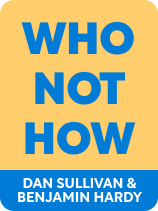

This article is an excerpt from the Shortform book guide to "Who Not How" by Dan Sullivan. Shortform has the world's best summaries and analyses of books you should be reading.
Like this article? Sign up for a free trial here .
Why is it better to hire an expert to do a difficult job for you rather than trying to do it yourself? How can you go about finding the right person for the right job?
In their book Who Not How, Sullivan and Hardy say that you will always be better off hiring somebody to do a job for you than trying to figure it out yourself. Not only are you guaranteed to get a better result, but it may even end up cheaper than if you try to do it yourself and end up making the situation worse.
Here’s how the authors recommend finding the right person for the job.
Hiring the Right Person
Before we delve into the benefits of doing so, let’s explore the Who Not How authors’ method for finding the right person for the right job. Use this method when you write the job description for any prospective hire, no matter what role you’re trying to fill.
First, Sullivan and Hardy say, make sure your vision and purpose are clear. Doing so is critical to helping the right person find you, the authors explain—someone out there has the skill set you need and they’re looking for an opportunity to use it to achieve something great. Offer a goal the right person will be proud to have accomplished; this way, you establish a relationship that benefits both parties (no expert will be drawn to a task that doesn’t offer them value). To ensure your vision is clear and that you can communicate it well, write it down.
(Shortform note: There’s another reason that you need to know exactly what you want when it comes to hiring experts: If you don’t provide a clear vision and focus, you’ll lose control of your business. An expert is confident in his knowledge and skills, so he’ll have his own ideas regarding how best to use them. If you’re not clear about what you want, he’ll do what he thinks is best, and the outcome will blindside you.)
Then, the authors say, determine what kind of person you need, and find that person. For example, if your goal is to build a library in New Orleans, you probably need a licensed architect with experience designing hurricane-proof buildings. Chances are, you don’t know how to find someone like that, so your next question should be, “Who can help me find the person I need?” Communicate your vision to that person, and let them find you the expert you need.
However, the authors note that if you make your goal concrete enough, you may not have to find someone to seek out experts for you. According to Sullivan and Hardy, when the right person—someone who can efficiently provide excellent results—understands your vision, he or she will be drawn to it: They’ll seek you out.
(Shortform note: Talent acquisition firms highlight two behaviors critical to finding the “right person” for a job that Sullivan and Hardy don’t mention here. First, use your existing personnel as a resource—assuming you treat them well, they’ll happily recommend you to any capable connections. (If employee satisfaction is low, perhaps hold off on this until you can be sure your people will have good things to say about the company.) Second, accept that finding the right person will take time: The more specialized the task, the more time you’ll have to commit. If you try to rush hiring, you’re more likely to take on someone underqualified or unsuitable for the role.)
Focus on Results, Not Cost
Hiring personnel, or the “right people” for each task, will cost money. However, the authors caution you against thinking of personnel as a cost—a spend that returns nothing. Rather, they argue that personnel are an investment—a spend that creates value.
Indeed, Sullivan and Hardy argue that the concept of “cost” holds you back in almost every arena because you hold on to money when you’d be better off spending it. They explain that every time you “save” money, you chip away at the value of your eventual result: You use cheaper materials or less skilled labor. In the end, you’ve “saved money,” but your product is less valuable, which devalues your business and the time you spent and diminishes your earnings and outcomes.
(Shortform note: A cost focus causes even more harm than the authors suggest: Managers who focus on decreasing expenses and increasing revenue tend to create rigid systems that leverage threats of punishment and failure to control personnel. This often leads to progressively worse outcomes. Such systems further disincentivize investment because instead of doing their best, each employee does only enough to avoid punishment.)
On the other hand, Sullivan and Hardy say, when you prioritize results over cost, your best move is always to invest in personnel. An investment-minded entrepreneur asks, “Who can I hire to achieve the best result?” Hiring an expert guarantees a stellar result, so don’t worry about how to solve your problems or realize your vision. Just find the right people, and invest.
(Shortform note: It’s becoming increasingly popular to focus on people over profits, but research suggests that, as Sullivan and Hardy argue, it’s crucial to focus on results and people. However, studies also show that it’s tough for any one person to do both: Those who score high on people skills tend to score low on the kind of analytical thinking that prioritizes results, and vice-versa. You’ll want to hire a balanced team to ensure equal advocacy for both priorities.)

———End of Preview———
Like what you just read? Read the rest of the world's best book summary and analysis of Dan Sullivan's "Who Not How" at Shortform .
Here's what you'll find in our full Who Not How summary :
- Why you should stop trying to do everything yourself and just hire someone
- Why minimizing cost should not be the primary goal
- How you can reclaim your valuable time at work and home






